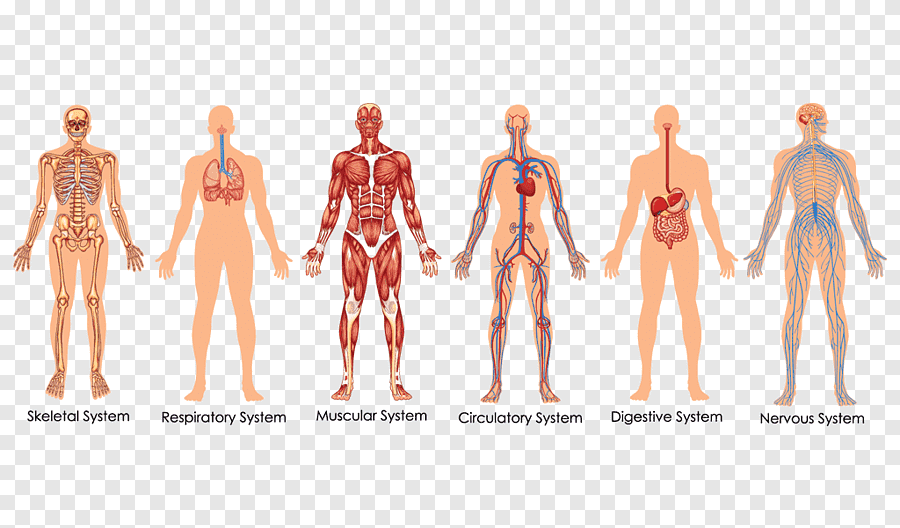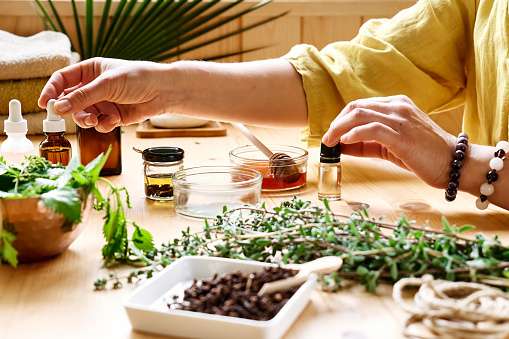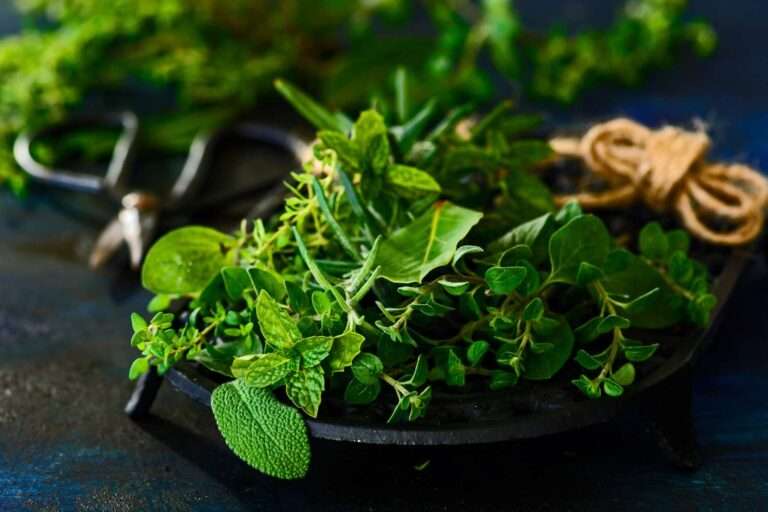
Herbal medicine aims to return the body to a state of natural balance so that it can heal itself. Different herbs act on different systems of the body.
Some herbs that are commonly used in herbal medicine, and their traditional uses, include:
- Echinacea – to stimulate the immune system and aid the body in fighting infection. Used to treat ailments such as boils, fever and herpes.
- Dong quai (dang gui) – used for gynaecological complaints such as premenstrual tension, menopause symptoms and period pain. Some studies indicate that dong quai can lower blood pressure.
- Garlic – used to reduce the risk of heart disease by lowering levels of blood fats and cholesterol (a type of blood fat). The antibiotic and antiviral properties of garlic mean that it is also used to fight colds, sinusitis and other respiratory infections.
- Ginger – many studies have shown ginger to be useful in treating nausea, including motion sickness and morning sickness.
- Ginkgo biloba – commonly used to treat poor blood circulation and tinnitus (ringing in the ears).
- Ginseng – generally used to treat fatigue, for example during recovery from illness. It is also used to reduce blood pressure and cholesterol levels, however overuse of ginseng has been associated with raised blood pressure.
- Hypericum perforatum – commonly known as St John’s Wort. Studies have suggested that St John’s Wort is just as effective as some pharmaceutical antidepressants in treating mild to moderate depression. It is also used for anxiety and insomnia. However, St John’s Wort can interact with a number of prescription medications, including the oral contraceptive pill, and stop them from working properly.
What Are the Benefits of Herbal Medicine?
Herbal remedies have been in use for thousands of years by indigenous tribes and cultures like the Africans, Indians, and Chinese. Before we had synthetic medicine in the West, our apothecaries were similarly full of medicinal herbs and folk therapies.
While some of the more outlandish treatments were unfounded, many of the ingredients used by our ancestors have been proven to have therapeutic effects. What are the benefits of herbal medicine to our bodies, and how can this ancient wisdom help us today?
1. Fewer Side Effects
Did you know that 66 percent of adults in the United States use prescription drugs? Because prescription medication can be strong, it can be accompanied by significant side effects. Even common antibiotics that doctors often prescribe can create gastrointestinal issues such as cramps and diarrhea as well as cause serious issues like heart palpitations or seizures.
In contrast, herbal medicines are generally gentler on the body. When taken at the recommended doses, natural treatments result in fewer side effects. By using a natural drug instead of a pharmaceutical one, you may be able to reduce your reliance on synthetic medications and avoid their possible side effects. If you are currently on prescription medications be sure to check for drug interactions before taking herbal remedies.
2. More Accessible
Healthcare is getting increasingly expensive. Without insurance, it can cost a fortune just to see a general practitioner and a ton more to purchase the prescribed drugs. Since they are crafted from bountiful natural resources instead of being synthetically manufactured in a lab, herbal medicines are generally more affordable. This also means that they are easier for people to obtain than prescription medicine.
While you may like to consult an alternative medicine practitioner or a trained traditional healer before committing to an herbal treatment program, you do not have to navigate the prescription medication procedure created by Big Pharma. Once you know which herbs you need, you can purchase quality natural supplements easily from reputable online stores such as Dr Eboka Herbal Remedies
3. Holistic Health
Unlike many modern approaches that manage symptoms without addressing the root causes, traditional medicine is all about holistic health and maintaining balance within the body. This means that your alternative medicine practitioner will try to diagnose what your body is trying to tell you and formulate a treatment plan that is matched to your specific physical condition and requirements.
This journey of restoration is sometimes not simply one of the body but also of the mind and spirit. Although modern medicine understands the connection between psychological and physiological health, it can be difficult to find doctors who are able to guide their patients to full healing. Natural practitioners, however, are more open to integrating therapies to achieve true holistic health.
4. Empower Yourself
Herbal medicine offers you autonomy, whether you are disillusioned with the modern medical system or simply want to be more in control of your health. Traditional healers provide their patients with the knowledge to prevent illness, manage their chronic conditions, and promote healing. Once you are attuned to your body, you will be able to see and feel the effects of the herbal supplements that you take.
Because you can witness the positive effects on your body when you make lifestyle changes for the better, you become more motivated and empowered to undertake the journey of healing. Your fate is no longer in the hands of pharmaceuticals and multimillion-dollar corporations. Your health is in your hands, and you are informed enough to make the right choices and give your body what it needs.
If you are tired of modern medicine and pharmaceutical drugs, consider the potential of traditional herbal medicine. Consult a doctor with experience in alternative medicine or speak to a trained traditional healer to find out how herbal medicine can heal you from the inside out.

Good herb and food combinations
There are unlimited ways to use herbs in your cooking. Here are some traditional pairings to get you started:
- basil – pesto, tomato sauce, tomato soup, tomato juice, potato dishes, prawns, meat, chicken and poultry, pasta, rice, egg dishes, strawberries
- bay leaves – soups, stews, casseroles, meat and poultry marinades, stocks
- chilli – meat, chicken and poultry, shellfish, tomato dishes, curries
- chives – salads, chicken, soups, cheese dishes, egg dishes, mayonnaise, vinaigrettes
- coriander – Asian dishes, stir fries, curries, soups, salads, seafood, guacamole
- dill – salads, sauces, fish, sour cream, cheese and potato dishes
- fennel – stuffings, sauces, seafood, salads
- garlic – soups, sauces, pasta, meat, chicken, shellfish, pesto, salad dressings, bread
- ginger – cakes, biscuits, Asian dishes
- lemongrass – Asian dishes, stir fries, curries, seafood, soups, tea
- marjoram – meat, fish, egg dishes, cheese dishes, pizza
- mint – drinks, confectionery, meat, chicken, yoghurt, desserts, sauces, vegetable dishes
- oregano – cheese dishes, egg dishes, tomato sauce, pizza, meat, stuffing, bread, pasta
- parsley – pesto, egg dishes, pasta, rice dishes, salads, butter, sauces, seafood, vegetable dishes
- rosemary – fish, poultry, meat, bread, sauces, soups
- sage – stuffings, tomato dishes, cheese dishes, pumpkin dishes, chicken dishes
- tarragon – salad dressing, egg dishes
- thyme – chowders, bread, chicken and poultry, soups, stock, stews, stuffings, butter, cheese, mayonnaise, mustard, vinegar.
Just remember that for health benefits, butters and creams are best saved for sometimes rather than everyday foods.
Tips for cooking with herbs
Suggestions for cooking with herbs include:
- Dried herbs are more strongly flavoured than fresh. As a general rule, one teaspoon of dried herbs equals 4 teaspoons of fresh.
- If you regularly use herbs, you might like to create a ‘bouquet garni’ by tying chopped and mixed herbs in little muslin bags – these can be added to your cooking for flavour but removed before serving.
- Some herbs are hardier than others (like rosemary and parsley) and will retain their flavour during the cooking process – these can be added at the start of your cooking.
- Some herbs are used only to flavour a dish but are not eaten – bay leaves for example.
- The flavour of herbs fades with time, so discard dried herbs after 12 months.
- Dried whole herbs, where the leaves are still attached to their stalk, tend to have a stronger flavour than loose leaves sold in packets or jars.
